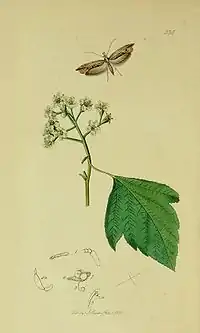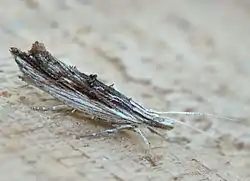Ypsolopha scabrella
Ypsolopha scabrella, the wainscot hooktip or wainscot smudge, is a moth of the family Ypsolophidae. The species was first described by Carl Linnaeus in 1761. It is found in Europe, China, Russia, Asia Minor and mideast Asia.

| Ypsolopha scabrella | |
|---|---|
 | |
 | |
| Scientific classification | |
| Kingdom: | |
| Phylum: | |
| Class: | |
| Order: | |
| Family: | |
| Genus: | |
| Species: | Y. scabrella |
| Binomial name | |
| Ypsolopha scabrella Linnaeus, 1761 | |
The wingspan is 20–22 mm. The head and thorax are whitish, streaked with dark fuscous. Forewings with apex acutely produced ; whitish, more or less sprinkled with light purplish fuscous and black, veins ferruginous-brown ; dorsal half more or less wholly suffused with dark purplish-fuscous, with one or two black streaks, a dorsal streak darker ; three blackish scale tufts below fold and one above tornus. Hindwings are light grey,darker posteriorly.The larva is green : dorsal line broad, white; dots black.[1]
The moth flies from July to September depending on the location.
The larvae feed on apple, Crataegus and Cotoneaster.
References
- Meyrick, E., 1895 A Handbook of British Lepidoptera MacMillan, London pdf
 This article incorporates text from this source, which is in the public domain. Keys and description
This article incorporates text from this source, which is in the public domain. Keys and description
External links
![]() Media related to Ypsolopha scabrella at Wikimedia Commons
Media related to Ypsolopha scabrella at Wikimedia Commons
- Waarneming.nl (in Dutch)
- Lepidoptera of Belgium
- Kimber, Ian. "17.005 BF455 Ypsolopha scabrella (Linnaeus, 1761)". UKMoths. Retrieved 23 October 2020.